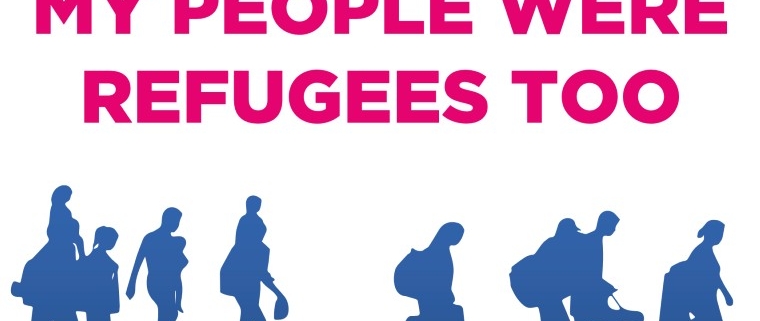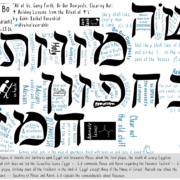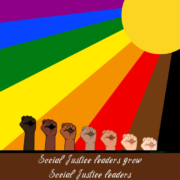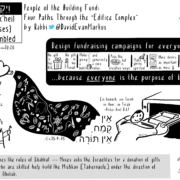Refugee Shabbat and a Mishkan for all: Parsha Pekudei
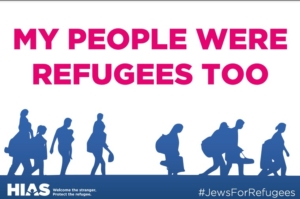
What does it mean to have a home, a bayit? Is it a physical shelter, a safe place to sleep and eat and work (and everything else during parts of the pandemic)? What about that saying “home is where the heart is”? A nexus of memories, of meaning, of community, of family, of connection, of love.
This Shabbat we complete the book of Shemot (Exodus), with parsha Pekudei. The Israelites, a mixed multitude that had fled slavery in Mitzrayim and encountered God and Torah in the desert, finish building the mishkan and the ohel moed (Tent of Meeting). “Mishkan” comes from the root “shokhen,” to dwell, and it serves as a pied-a-terre of sorts for the Shechinah, the Divine presence. As such the Mishkan serves as a home for God and the Israelites while the Israelites wander through the desert. Home is literally where the heart is.
Unlike the first set of tablets which were created by God (and subsequently smashed by Moses when he descended Sinai and saw the Golden Calf), this is a human build. And unlike the Golden Calf, a symbol of idol worship built out of fear of being abandoned by God and Moses, it is designed for a just pursuit – to create space, to create a home in the wilderness. There is something particularly beautiful about the image of all the Israelites putting their best efforts and resources forward to create space for the Divine amongst them, to create a world worthy of God. It teaches that we can do it, and that we must – it is aleinu, it is on us, to keep building a mishkan, a home, worthy of each other, made in the Divine image, and the Divine.
The past week has brought the notion of home into stark relief as we pray for the safety of Ukrainians following Russia’s aggressive and unprecedented invasion that began last week, in an affront to human rights and dignity, security, and the rules-based international order. In just one week more than one million people, a record exodus, have already fled Ukraine in a growing refugee crisis across Europe, and numbers can go much higher. For many of us the war in Ukraine feels close to home. For some it is connected to our past as a land that relatives of ours may have fled over a hundred years ago (like my great-grandmother Esther z’l who fled to Canada as a young child with her uncle escaping pogroms), or where others perished during the Shoah, as at the Kiev ravine of Babi Yar, site of the murder of tens of thousands of Jews, where Jewish Ukrainian president Volodymyr Zelenskyy exclaimed that Russian airstrikes by the site have re-attacked the memories of those lost. And for many Ukraine has been the home, the mishkan, of a vibrant Jewish present – with active communities that have flourished since the fall of the Iron Curtain, though one that is right now at risk (see the moving update and Shabbat message from Rabbi Alexander Dukhovny direct from Kiev).
It is timely that this Shabbat is also International Refugee Shabbat, an opportunity to deepen our understanding of the global refugee crisis, be inspired by our tradition, and redouble and reaffirm our support for refugees and asylum seekers. In North America Refugee Shabbat is a joint initiative by HIAS (Hebrew Immigrant Aid Society) in the United States and JIAS (Jewish Immigrant Aid Society) in Canada, with co-sponsors from across denominations and around the world. The UNHCR (UN High Commission on Refugees) estimates that over 84 million people around the world today have been forced to leave their homes and communities due to conflict and persecution. Among them are nearly 26.6 million refugees (living in temporary, transitory circumstances outside of their country of origin).
Refugees, specifically defined and protected in international law, are people who have fled their home countries because of feared persecution, conflict or violence that is so intolerable and perilous that they leave their home to seek safety in other countries. They are recognized in law because of the potentially deadly danger of returning home and their need to seek sanctuary elsewhere. Article 14 of the Universal Declaration of Human Rights, written in the aftermath of the Second World War and the Shoah, asserts that “everyone has the right to seek and to enjoy in other countries asylum from persecution.” This principle was given direction in the 1951 Convention related to the Status of Refugees. Many of our communities continue to support refugees fleeing Afghanistan following the Taliban takeover last summer, and more.
What it means to be a stranger, and how to treat strangers, lies at the heart of our Jewish tradition and narrative. Earlier on in the book of Exodus, in parsha Mishpatim (laws), God commands the Israelites to “not wrong or oppress a stranger, for you were strangers in the land of Egypt” (22:20) and reiterates “You shall not oppress a stranger, for you know the feelings of the stranger, having yourselves been strangers in the land of Egypt” (23:9). In Leviticus (19:34) and Deuteronomy (10:19) we are taught to love the stranger. We have lived these values sponsoring refugees from across the world, from Vietnam to Syria, from Afghanistan to Ukraine. There is more that we can do to meet the challenges of the current moment – from advocating for better policies for asylum seekers in our countries and worldwide to supporting and sponsoring refugees in our communities.
In the desert the Israelites came together and gave of themselves to build the mishkan, the dwelling place for the Divine. Right now it feels ever more important to come together to support each other, pray for peace and safety, and light candles of hope and commitment. And hope and candles and prayers aren’t enough. We must speak out, we must act, we must do, we must build. This Shabbat, in the current global refugee crisis, we are called upon to offer a mishkan, a dwelling place, and a bayit, a home, to our global neighbours in need. And we are called upon to stand up to the oppression, persecution, and violence that have forced millions to leave their homes to seek refuge elsewhere.
#bealight #vahavtalreachakamocha #lovethyneighbour #lovethestranger #olamchesedyibaneh
Learn more and sign up for Refugee Shabbat here: Refugee Shabbat: Exploring Jewish Values in Action | HIAS and Refugee Shabbat | HIAS
In addition to organisations such as the Red Cross and UNHCR, as well as agencies such as HIAS (US) and JIAS (Canada) multiple Jewish organisations have launched funds to support communities in Ukraine:
- Jewish Federations of North America 2022 Ukraine Crisis Fund: Crisis in Ukraine | The Jewish Federations of North America (US) (and in Canada: Crisis in Ukraine. Your help is urgently needed. (givingfuel.com))
- Hillel International Emergency Relief Fund Ukraine: Urgent: Hillel International Emergency Relief Fund | Hillel
- The World Union for Progressive Judaism, which is the international network of the Reform, Liberal, Progressive and Reconstructionist movements, has launched a Ukraine crisis fund: World Union Launches Ukraine Crisis Fund | World Union for Progressive Judaism (wupj.org)
- The Orthodox Union has as well: The Jews of Ukraine Desperately Need Your Help – Orthodox Union

Rabbi Dara Lithwick, the lead builder at Builders Blog, is an advocate for LGBTQ2+ inclusion within diverse Jewish spaces and for Jewish inclusion in LGBTQ2+ spaces. When not at work as a constitutional and parliamentary affairs lawyer, Rabbi Dara is active as an outreach rabbi at Temple Israel Ottawa. She is a member of Bayit’s Board of Directors.

